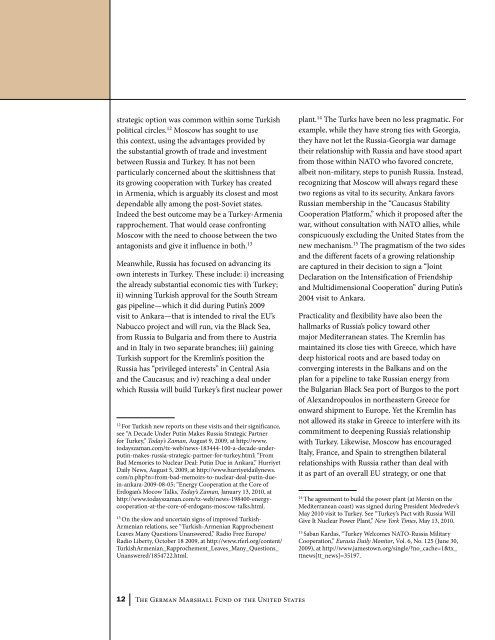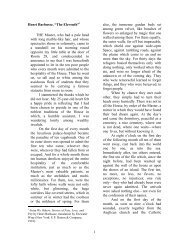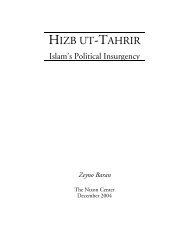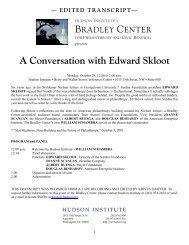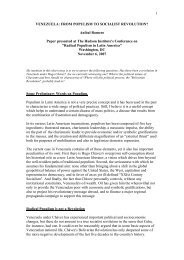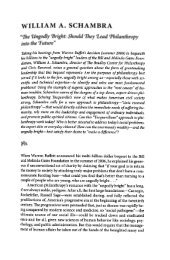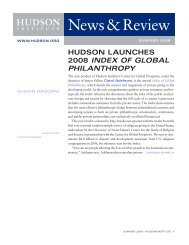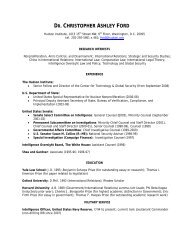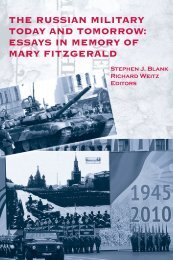NEW PLAYERS IN THE MEDITERRANEAN - German Marshall ...
NEW PLAYERS IN THE MEDITERRANEAN - German Marshall ...
NEW PLAYERS IN THE MEDITERRANEAN - German Marshall ...
You also want an ePaper? Increase the reach of your titles
YUMPU automatically turns print PDFs into web optimized ePapers that Google loves.
strategic option was common within some Turkish<br />
political circles. 12 Moscow has sought to use<br />
this context, using the advantages provided by<br />
the substantial growth of trade and investment<br />
between Russia and Turkey. It has not been<br />
particularly concerned about the skittishness that<br />
its growing cooperation with Turkey has created<br />
in Armenia, which is arguably its closest and most<br />
dependable ally among the post-Soviet states.<br />
Indeed the best outcome may be a Turkey-Armenia<br />
rapprochement. That would cease confronting<br />
Moscow with the need to choose between the two<br />
antagonists and give it influence in both. 13<br />
Meanwhile, Russia has focused on advancing its<br />
own interests in Turkey. These include: i) increasing<br />
the already substantial economic ties with Turkey;<br />
ii) winning Turkish approval for the South Stream<br />
gas pipeline—which it did during Putin’s 2009<br />
visit to Ankara—that is intended to rival the EU’s<br />
Nabucco project and will run, via the Black Sea,<br />
from Russia to Bulgaria and from there to Austria<br />
and in Italy in two separate branches; iii) gaining<br />
Turkish support for the Kremlin’s position the<br />
Russia has “privileged interests” in Central Asia<br />
and the Caucasus; and iv) reaching a deal under<br />
which Russia will build Turkey’s first nuclear power<br />
12<br />
For Turkish new reports on these visits and their significance,<br />
see “A Decade Under Putin Makes Russia Strategic Partner<br />
for Turkey,” Today’s Zaman, August 9, 2009, at http://www.<br />
todayszaman.com/tz-web/news-183444-100-a-decade-underputin-makes-russia-strategic-partner-for-turkey.html;<br />
“From<br />
Bad Memories to Nuclear Deal: Putin Due in Ankara,” Hurriyet<br />
Daily News, August 5, 2009, at http://www.hurriyetdailynews.<br />
com/n.php?n=from-bad-memoirs-to-nuclear-deal-putin-duein-ankara-2009-08-05;<br />
“Energy Cooperation at the Core of<br />
Erdogan’s Mocow Talks, Today’s Zaman, January 13, 2010, at<br />
http://www.todayszaman.com/tz-web/news-198400-energycooperation-at-the-core-of-erdogans-moscow-talks.html.<br />
13<br />
On the slow and uncertain signs of improved Turkish-<br />
Armenian relations, see “Turkish-Armenian Rapprochement<br />
Leaves Many Questions Unanswered,” Radio Free Europe/<br />
Radio Liberty, October 18 2009, at http://www.rferl.org/content/<br />
TurkishArmenian_Rapprochement_Leaves_Many_Questions_<br />
Unanswered/1854722.html.<br />
plant. 14 The Turks have been no less pragmatic. For<br />
example, while they have strong ties with Georgia,<br />
they have not let the Russia-Georgia war damage<br />
their relationship with Russia and have stood apart<br />
from those within NATO who favored concrete,<br />
albeit non-military, steps to punish Russia. Instead,<br />
recognizing that Moscow will always regard these<br />
two regions as vital to its security, Ankara favors<br />
Russian membership in the “Caucasus Stability<br />
Cooperation Platform,” which it proposed after the<br />
war, without consultation with NATO allies, while<br />
conspicuously excluding the United States from the<br />
new mechanism. 15 The pragmatism of the two sides<br />
and the different facets of a growing relationship<br />
are captured in their decision to sign a “Joint<br />
Declaration on the Intensification of Friendship<br />
and Multidimensional Cooperation” during Putin’s<br />
2004 visit to Ankara.<br />
Practicality and flexibility have also been the<br />
hallmarks of Russia’s policy toward other<br />
major Mediterranean states. The Kremlin has<br />
maintained its close ties with Greece, which have<br />
deep historical roots and are based today on<br />
converging interests in the Balkans and on the<br />
plan for a pipeline to take Russian energy from<br />
the Bulgarian Black Sea port of Burgos to the port<br />
of Alexandropoulos in northeastern Greece for<br />
onward shipment to Europe. Yet the Kremlin has<br />
not allowed its stake in Greece to interfere with its<br />
commitment to deepening Russia’s relationship<br />
with Turkey. Likewise, Moscow has encouraged<br />
Italy, France, and Spain to strengthen bilateral<br />
relationships with Russia rather than deal with<br />
it as part of an overall EU strategy, or one that<br />
14<br />
The agreement to build the power plant (at Mersin on the<br />
Mediterranean coast) was signed during President Medvedev’s<br />
May 2010 visit to Turkey. See “Turkey’s Pact with Russia Will<br />
Give It Nuclear Power Plant,” New York Times, May 13, 2010.<br />
15<br />
Saban Kardas, “Turkey Welcomes NATO-Russia Military<br />
Cooperation,” Eurasia Daily Monitor, Vol. 6, No. 125 (June 30,<br />
2009), at http://www.jamestown.org/single/?no_cache=1&tx_<br />
ttnews[tt_news]=35197.<br />
12<br />
The <strong>German</strong> <strong>Marshall</strong> Fund of the United States


